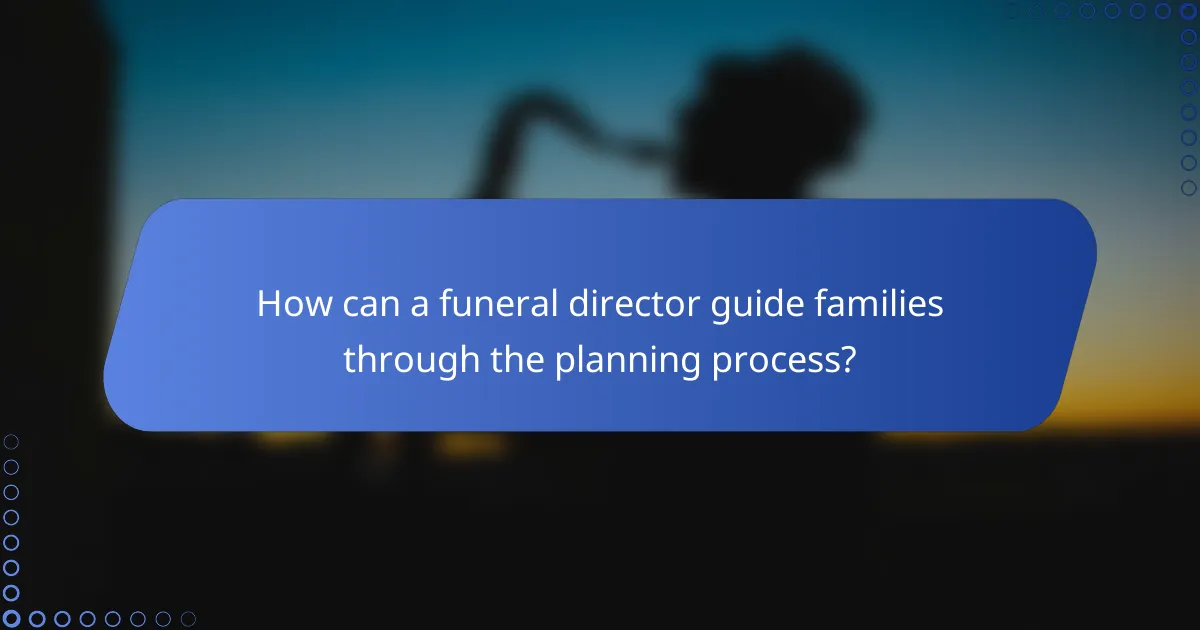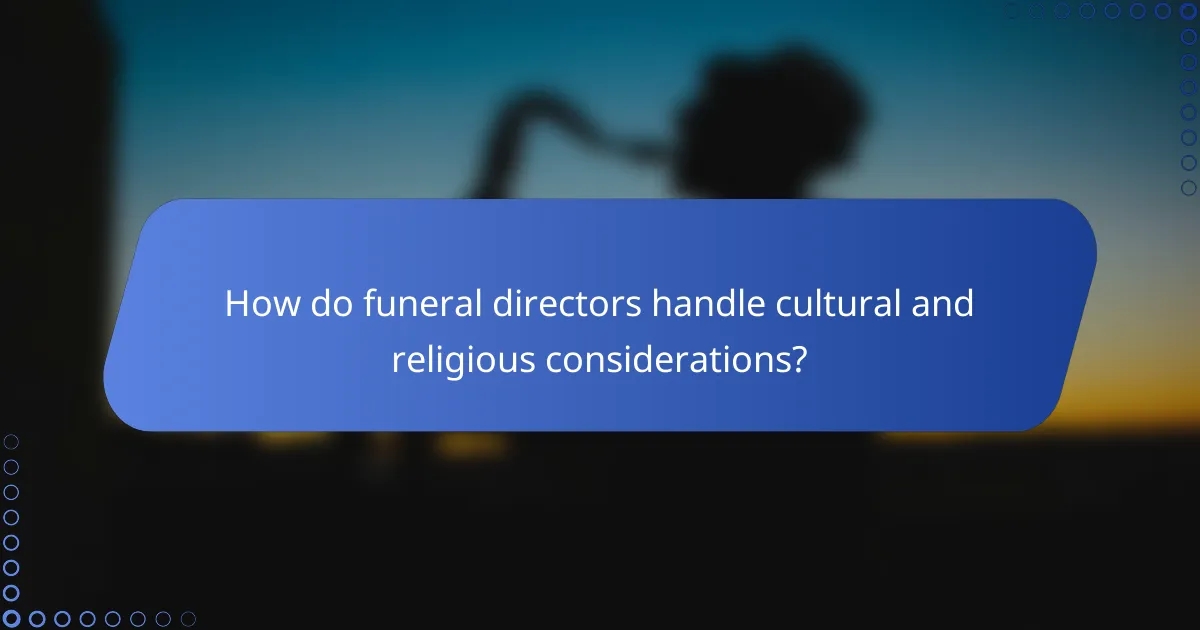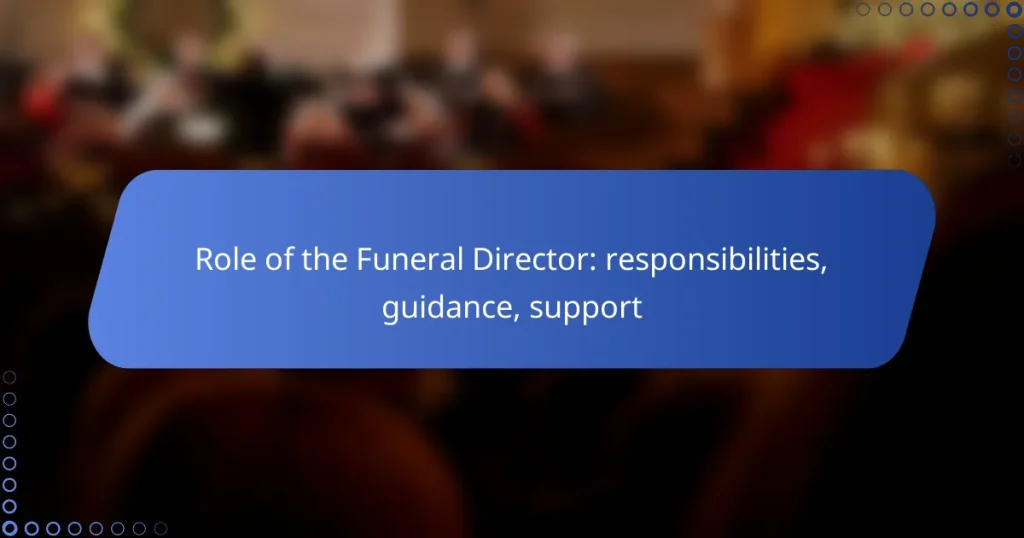A funeral director plays a vital role in supporting families during their time of grief by managing all aspects of funeral services. They provide expert guidance and emotional support, helping families navigate decisions and arrangements with care and respect. From coordinating services to handling legal documentation, funeral directors ensure that every detail is addressed, allowing families to focus on honoring their loved ones.

What are the responsibilities of a funeral director in Canada?
A funeral director in Canada is responsible for managing all aspects of funeral services, ensuring that families receive the support and guidance they need during a difficult time. Their duties encompass coordinating services, providing emotional support, managing legal documentation, arranging transportation, and overseeing body preparation.
Coordinating funeral services
Coordinating funeral services involves planning and organizing the entire funeral process according to the family’s wishes. This includes selecting the venue, scheduling the service, and arranging for any religious or cultural rituals that may be required.
Funeral directors often work closely with families to create personalized services that reflect the deceased’s life and values. They may also liaise with various service providers, such as florists and musicians, to ensure everything runs smoothly on the day of the funeral.
Providing emotional support
Providing emotional support is a crucial aspect of a funeral director’s role. They offer compassion and understanding to grieving families, helping them navigate their feelings and make informed decisions during a challenging time.
Funeral directors may also provide resources for grief counseling or support groups, ensuring families have access to additional help if needed. Their empathetic approach can significantly ease the burden of planning a funeral.
Managing legal documentation
Managing legal documentation is essential for funeral directors, as they handle various forms and permits required by law. This includes obtaining death certificates, burial permits, and any necessary authorizations from family members.
Funeral directors ensure that all paperwork is completed accurately and submitted on time, which helps prevent delays in the funeral process. They also guide families through any legal requirements specific to their province or territory.
Arranging transportation
Arranging transportation is another key responsibility of funeral directors. They coordinate the transport of the deceased to the funeral home and later to the burial or cremation site, ensuring that all logistics are handled professionally.
Funeral directors typically provide a hearse and may also arrange for family transportation to the service. They ensure that all vehicles are appropriate and meet the family’s needs, considering factors such as accessibility and comfort.
Overseeing body preparation
Overseeing body preparation is a vital duty of funeral directors, who ensure that the deceased is treated with dignity and respect. This process may involve embalming, dressing, and cosmetology to prepare the body for viewing.
Funeral directors work with licensed professionals to adhere to health regulations and industry standards, ensuring that the body is preserved and presented in a way that honors the deceased’s memory. They also provide families with options for viewing and memorialization, helping them make choices that align with their cultural or personal preferences.

How can a funeral director guide families through the planning process?
A funeral director plays a crucial role in guiding families through the planning process by providing expert advice, support, and personalized options. They help families navigate decisions during a challenging time, ensuring that all aspects of the funeral are handled with care and respect.
Offering personalized service options
Funeral directors offer a range of personalized service options tailored to meet the unique needs and wishes of each family. This may include selecting specific caskets, urns, or memorial items that reflect the deceased’s personality and preferences.
Additionally, they can assist in planning various types of services, such as traditional funerals, memorial services, or even celebratory events. Understanding the family’s cultural or religious practices is essential in providing suitable options.
Explaining funeral costs
Funeral directors are responsible for clearly explaining the costs associated with different services and products. They provide itemized price lists, helping families understand what each service entails and how it impacts the overall budget.
It’s important for families to discuss their financial constraints upfront, as funeral costs can vary significantly. Directors can suggest affordable alternatives or packages that fit within a family’s budget, ensuring transparency throughout the planning process.
Assisting with memorialization choices
Funeral directors assist families in making meaningful memorialization choices that honor the deceased’s life. This can include selecting appropriate readings, music, and personal tributes that resonate with family members and friends.
They can also provide guidance on creating personalized keepsakes, such as photo displays or memory tables, which can enhance the memorial experience. Understanding the family’s vision for the memorial can help the director suggest creative ideas that reflect the deceased’s legacy.

What support do funeral directors provide to grieving families?
Funeral directors offer essential support to grieving families by guiding them through the funeral process and providing emotional assistance. Their role encompasses practical arrangements as well as connecting families to resources that can help them cope with their loss.
Emotional counseling
Funeral directors often provide emotional counseling to families during one of the most challenging times in their lives. They are trained to listen and offer comfort, helping families express their feelings and navigate their grief. This support can be crucial in helping individuals process their emotions and begin to heal.
Many funeral homes have staff members who specialize in grief counseling, offering a safe space for families to discuss their feelings. This can include one-on-one sessions or informal conversations that help families feel understood and supported.
Connecting to grief resources
Funeral directors play a vital role in connecting families to grief resources that can aid in their healing journey. They often provide information about local support groups, counseling services, and online resources tailored to different types of loss. This access to resources can empower families to seek additional help as needed.
In addition, funeral directors may offer literature or referrals to organizations that specialize in grief support, ensuring families have the tools they need to cope effectively. These resources can range from books and articles to workshops and seminars focused on grieving.
Facilitating support groups
Many funeral directors facilitate support groups for grieving families, creating a community where individuals can share their experiences and feelings. These groups often meet regularly and provide a structured environment for participants to connect with others who are facing similar challenges.
Support groups can vary in format, from informal gatherings to more structured sessions led by trained facilitators. They offer a platform for sharing stories, discussing coping strategies, and fostering connections that can help alleviate feelings of isolation during the grieving process.

What are the key qualities to look for in a funeral director?
When selecting a funeral director, look for qualities such as compassion, strong communication skills, and professionalism. These traits ensure that the director can provide the necessary support and guidance during a difficult time.
Compassion and empathy
Compassion and empathy are essential qualities in a funeral director, as they help create a supportive environment for grieving families. A director who demonstrates understanding and kindness can ease the emotional burden during the planning process.
Look for a funeral director who listens attentively and responds to your needs with sensitivity. This personal connection can make a significant difference in how families cope with loss.
Strong communication skills
Effective communication is crucial for a funeral director to convey important information clearly and compassionately. They should be able to explain the various options available, including service types, costs, and legal requirements.
Ensure the director is approachable and willing to answer questions. Good communication fosters trust and helps families feel more comfortable making decisions during a challenging time.
Experience and professionalism
Experience and professionalism are vital when choosing a funeral director, as they indicate a solid understanding of the industry and its regulations. An experienced director will be familiar with local customs and practices, ensuring that services are conducted respectfully.
Check for credentials and affiliations with professional organizations, as these often reflect a commitment to high standards. A professional demeanor can instill confidence that your loved one’s arrangements are in capable hands.

How do funeral directors handle cultural and religious considerations?
Funeral directors play a crucial role in accommodating cultural and religious considerations during funeral services. They ensure that the wishes of the deceased and their family are respected, providing guidance and support tailored to specific traditions and beliefs.
Respecting diverse traditions
Funeral directors must be knowledgeable about various cultural and religious practices to effectively respect diverse traditions. This includes understanding rituals, mourning periods, and specific customs that may vary significantly between communities. For example, some cultures may require a wake, while others may focus on a specific prayer service.
To ensure that all traditions are honored, funeral directors often consult with families about their specific needs and preferences. This open communication helps to build trust and ensures that the service reflects the values and beliefs of the deceased and their loved ones.
Customizing services for specific beliefs
Customizing funeral services to align with specific beliefs involves incorporating elements that are meaningful to the deceased’s faith or cultural background. This may include selecting appropriate music, readings, and symbols that resonate with the family’s traditions. For instance, a Jewish funeral may include the recitation of the Kaddish, while a Hindu service might involve rituals like the lighting of a diya.
Funeral directors can also assist families in choosing burial or cremation options that align with their beliefs. Understanding local regulations and practices is essential, as some regions may have specific requirements for certain religious ceremonies. By providing tailored services, funeral directors help families honor their loved ones in a way that feels authentic and respectful.

What are the legal requirements for funeral directors in Canada?
In Canada, funeral directors must adhere to specific legal requirements that vary by province or territory. Generally, they are required to obtain a license and complete relevant education and training to ensure compliance with local regulations.
Licensing and certification
Funeral directors in Canada must be licensed by the regulatory body in their respective province or territory. This typically involves completing a recognized funeral service program, which may take one to two years, followed by a period of apprenticeship or internship.
Certification often requires passing a provincial exam that tests knowledge of funeral practices, ethics, and relevant laws. Some provinces may also mandate continuing education to maintain licensure, ensuring that funeral directors stay updated on industry standards and regulations.
It is essential for aspiring funeral directors to check the specific requirements in their province, as they can vary significantly. For example, Ontario has its own set of regulations governed by the Bereavement Authority of Ontario, while British Columbia follows guidelines set by the Funeral Services Act.


